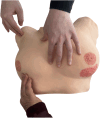The effect of simulation-based breast health education on breast cancer awareness and breast self-examination skills of Afghan refugee women: a randomized controlled trial
- PMID: 40457306
- PMCID: PMC12128285
- DOI: 10.1186/s12889-025-23313-y
The effect of simulation-based breast health education on breast cancer awareness and breast self-examination skills of Afghan refugee women: a randomized controlled trial
Abstract
Objectives: The aim of this study was to examine the effects of simulation-based breast health education on Afghan women's awareness of breast cancer, including knowledge of its risk factors, signs, and symptoms, as well as to improve their breast self-examination skills.
Study design: This study was a pre-test, post-test, parallel-arm randomized controlled trial.
Methods: The study sample consisted of 46 Afghan women, with 23 participants assigned to each of the intervention and control groups using block randomization. This study was conducted at the Social Development and Aid Mobilization (SGDD-ASAM) in Ankara, Türkiye. The intervention group received simulation-based breast health training. Each session of breast health education was 180 min. The simulation used a one-to-one show-and-do technique, which took approximately 120 min. Data were collected using the Breast Cancer Awareness Measure and the Breast Self-Examination Skill Assessment Form. The data were analyzed with the IBM SPSS 26 program. Descriptive statistics were used to evaluate the study data, including mean, standard deviation, percentage, and frequency distribution. The Shapiro-Wilk normality test was applied for further analysis. The Chi-Square (X2) Test was used to compare outcomes between groups. The significance level of p < 0.05 was considered.
Results: After the simulation-based training, there was a significant increase in confidence, skills, and behavior awareness among participants in the intervention group compared to the control group (p < 0.001). While there was no change in the control group, awareness of breast cancer, knowledge, and skills in the intervention group were predominantly rated as sufficient.
Conclusions: The simulation-based breast health education intervention for Afghan refugee women was found to be a practical and innovative approach to raising breast cancer awareness and providing breast self-examination skills. This intervention may play a significant role in identifying at-risk individuals and raising their awareness. If sustained, this could potentially increase future screening participation and early detection, ultimately contributing to improved patient outcomes. It is recommended that policymakers and health professionals prioritize the integration of simulation-based health education into prevention and health promotion strategies targeting disadvantaged populations, such as refugees and migrants, to improve early diagnosis and advance health equity.
Trial registration: Clinical Trials Number is NCT06051331. Registration date is 22.11.2023.
Keywords: Afghan women; Breast cancer awareness; Breast self-examination; Health education; Simulation-based education.
© 2025. The Author(s).
Conflict of interest statement
Declarations. Ethics approval and consent to participate: The study was reviewed and approved by the Hacettepe University Social Sciences and Humanities Research Ethics Committee in Türkiye (No: E-66777842–300-00003075359). The researchers explained the purpose of the study and obtained written informed consent from all participants prior to data collection. Participants were informed that they could withdraw from the study at any time without providing a reason. It was also clearly stated that no payments would be made to them during the study, nor would they be required to make any payments. For illiterate participants, a sworn translator read the entire consent form aloud in their native language. Upon confirming their understanding and voluntary agreement to participate, they provided consent by signing or marking the form in the presence of both the translator and an impartial witness. The study was conducted in accordance with the principles of the Declaration of Helsinki, ensuring ethical standards in research involving human participants, including respect for autonomy, beneficence, and confidentiality. Consent for publication: Not applicable. Competing interests: The authors declare no competing interests.
Figures
Similar articles
-
The Effect of Health Education Given to Syrian Refugee Women in Their Own Language on Awareness of Breast and Cervical Cancer, in Turkey: a Randomized Controlled Trial.J Cancer Educ. 2020 Apr;35(2):241-247. doi: 10.1007/s13187-019-01604-4. J Cancer Educ. 2020. PMID: 31414370 Clinical Trial.
-
The effect of web based and traditional self breast examination education on nursing students' knowledge, skills and self-directed learning skills: A randomised controlled study.Nurse Educ Pract. 2024 Nov;81:104167. doi: 10.1016/j.nepr.2024.104167. Epub 2024 Oct 23. Nurse Educ Pract. 2024. PMID: 39467338 Clinical Trial.
-
Effectiveness of face to face and virtual education to promote breast self-examination based on the theory of planned behavior: a randomized controlled trial study.BMC Cancer. 2025 Mar 26;25(1):548. doi: 10.1186/s12885-025-13935-1. BMC Cancer. 2025. PMID: 40140760 Free PMC article. Clinical Trial.
-
Folic acid supplementation and malaria susceptibility and severity among people taking antifolate antimalarial drugs in endemic areas.Cochrane Database Syst Rev. 2022 Feb 1;2(2022):CD014217. doi: 10.1002/14651858.CD014217. Cochrane Database Syst Rev. 2022. PMID: 36321557 Free PMC article.
-
Impact of summer programmes on the outcomes of disadvantaged or 'at risk' young people: A systematic review.Campbell Syst Rev. 2024 Jun 13;20(2):e1406. doi: 10.1002/cl2.1406. eCollection 2024 Jun. Campbell Syst Rev. 2024. PMID: 38873396 Free PMC article. Review.
References
-
- Alawa J, Hamade O, Alayleh A, Fayad L, Khoshnood K. cancer awareness and barriers to medical treatment among Syrian Refugees and Lebanese Citizens in Lebanon. J Cancer Educ. 2020;35(4):709–17. 10.1007/s13187-019-01516-3. - PubMed
-
- Alinier G, Hunt B, Gordon R, Harwood C. Effectiveness of intermediate‐fidelity simulation training technology in undergraduate nursing education. J Adv Nurs. 2006;54(3):359–69. 10.1111/j.1365-2648.2006.03810.x. - PubMed
-
- Alpteker H, Gümüş D, Doğan Ş, ve ark. Kız öğrencilerin meme kanseri ve kkmm bilgi ve uygulamalarının değerlendirilmesi. J Breast Health. 2011;7:176–81.
-
- AlizadehSabeg P, Mehrabi E, Nourizadeh R, Poursharifi H, Mousavi S. The effect of counselling on breast cancer awareness in rural Iranian women: a randomized controlled clinical trial. J Cancer Educ. 2019;34:1083–109. - PubMed
Publication types
MeSH terms
Associated data
LinkOut - more resources
Full Text Sources
Medical



